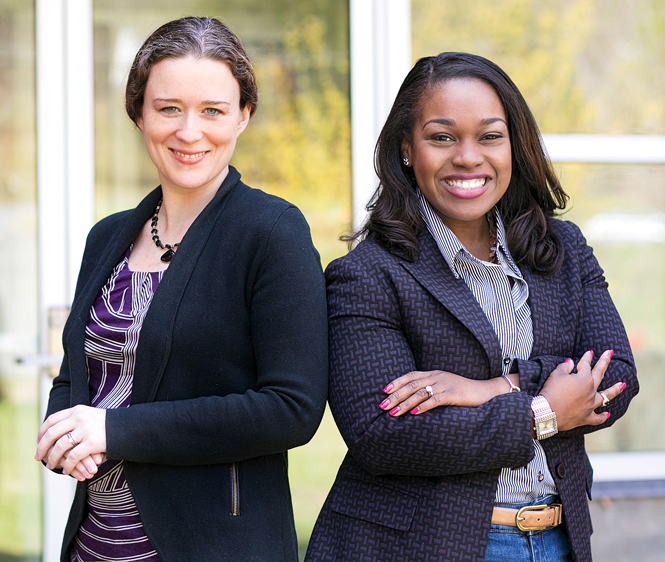By Jenny Morgan
Two new courses teach students how to make real-life public policy decisions.
[Courses] The first time Assistant Professor of Political Science Ashley Burns was asked to make a public policy decision, she was fresh out of college and interning for the Charlotte (N.C.) Housing Authority. The CEO wanted Burns to weigh in on a problem, and she dutifully outlined each option and all possible outcomes. “He looked at me like I was crazy,” she says. “He didn’t want a 20-page paper. He wanted me to tell him what to do.”
Last spring Burns and a colleague, Assistant Professor of Political Science Kerry Ratigan, took part in a Five College effort to bring public policy into the liberal arts classroom, and they’ve used that experience to create new, upper-level, policy-centric seminars.

From left: Kerry Ratigan and Ashley Burns
Burns has redesigned a previous course into an investigation of poverty and housing. “I want my students to feel like policymakers,” she says. “I want them to be able to take the skills they’ve gotten in political science and put them into practice.”
Next spring Ratigan will teach a new seminar on contemporary social issues in China. Students will research “very specific, focused areas of social policy—health, education, welfare or environmental policy,” she says.
“In a liberal arts environment, we have the intellectual luxury of engaging in philosophical, conceptual debates, and unpacking everything and making a critique of everything,” Ratigan says. “But policymakers want to know, ‘Well, what do you want us to do about this tomorrow?’”
In her own research, Burns studies public housing as a way to understand social stratification, particularly in the American South. She spent years researching a neighborhood in Durham, N.C., where a public housing community was demolished and then redeveloped as mixed-income housing.
“The idea behind mixed-income housing,” Burns says, “is an assumption that if assisted-housing residents live near relatively more affluent neighbors, those people will be good role models for the poor. However, such gains would rely on interaction and relationships, and I don’t find such outcomes in my research.”
Ratigan studies health care in rural China. In her survey of more than 1,000 people in 160 villages, she’s found that coastal regions with export-focused economies “tend to view social policy as a way to further develop their workforce,” and that these regions invest more in health care and education.
By contrast, parts of China that are not dependent on exports are more likely to invest in pensions, housing benefits and poverty alleviation. “They prioritize those programs over health and education,” she says.
Sandra Costello photo